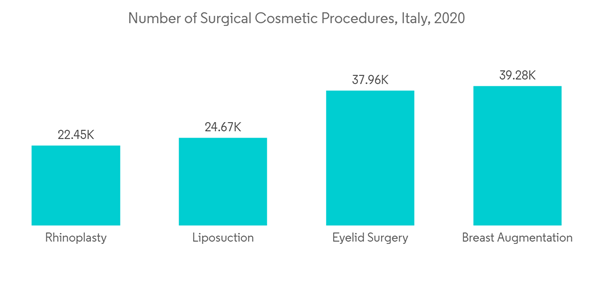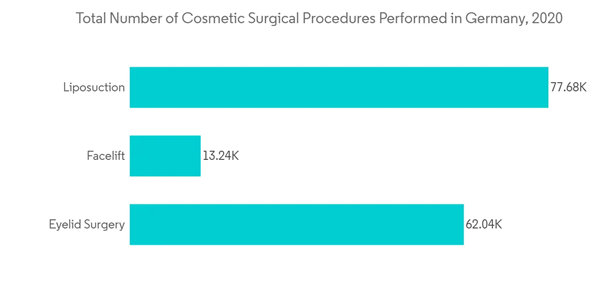The outbreak of COVID-19 impacted the European anesthesia drugs market, as hospitals and healthcare services were significantly reduced due to the social distancing measures enforced globally. In addition, intensivists and anesthesiologists are teaming up to treat COVID-19 patients. They reported that ventilated COVID-19 patients often require high doses of intravenous sedative drugs, such as propofol, midazolam, ketamine, and dexmedetomidine. As per a research study published in May 2020, titled 'Sedating Ventilated COVID-19 Patients with Inhalational Anesthetic Drugs', patients with severe lung injury from causes other than COVID-19 have shown that inhalational anesthetic drugs improve oxygenation and cause lower mortality, compared to propofol or midazolam. An article titled 'The impact of COVID-19 on anesthesia and critical care services in the UK: a serial service evaluation', published in the journal of Anaesthesia in September 2021, indicated that in January 2021, one-third of the anesthesia staff were unavailable, 42% of operating theaters were closed, and national surgical activity reduced to less than half, including reduced cancer and emergency surgery.
Moreover, the use of inhalational anesthetic drugs for ventilated COVID-19 patients is both practical and cost-effective in low- and high-income countries. These drugs allow sedation levels to be closely and rapidly controlled. These drugs reduce inflammation, dilate airways, and improve oxygenation, thus opening up new horizons for the market.
Certain factors driving the market growth include an increasing number of surgeries, new approvals of anesthetic drugs, and a reduction in the cost of newly invented drugs. In Europe, the number of surgeries being performed is increasing every year. The increase in the number of surgeries performed has a considerable impact on the anesthetics market, as anesthetics are widely used in all surgical procedures to reduce pain during surgery. According to the Royal College of Surgeons of England's data on the surgeries in England, published in May 2021, there were around 4.95 million people in England, waiting for surgery. A large number of surgeries in the region is expected to drive the growth of the anesthesia drugs market over the forecast period.
However, general anesthetic drugs cause several side effects, including nausea, vomiting, dry mouth, sore throat, shivering, muscle aches, disorientation, itching, sleepiness, and mild hoarseness. Other factors such as lack of skilled anesthetics and regulatory issues are restraining the market growth.
Europe Anesthesia Drugs Market Trends
Application in Plastic and Cosmetic Surgeries is Expected to Witness High Growth Over the Forecast Period
Plastic surgery is focused on the reconstruction and correction of facial and bodily defects, such as birth disorders, trauma, and burns. In addition, cosmetic surgery is performed to enhance a patient's appearance and improve aesthetic appeal, symmetry, and proportion of body parts. It is performed in all areas of the head, neck, and body. Cosmetic surgery includes breast enhancement, facial contouring, facial rejuvenation, body contouring, and skin rejuvenation.The advances in plastic surgery were furthered by the progress in anesthesiology, making it the cornerstone on which surgical progress was made. The availability of new anesthetics and adjuvant drugs, advances in trans- and postoperative monitoring, and the early prevention of complications facilitated these advances.
The COVID-19 pandemic affected plastic and cosmetic surgeries across European countries, which affected the market's growth. An article titled 'Elective, Non-urgent Procedures and Anesthetic Surgery in the Wake of SARS-COVID-19: Considerations Regarding Safety, Feasibility, and Impact on Clinical Management', published in the Journal of Anesthetic Plastic Surgery in May 2020, discussed the considerations for patient selection, choice of procedural complexity, duration of the procedure, type of anesthesia, etc., for surgical/anesthesia risk management and clinical management. Hence, it is observed that anesthesia is one of the integral parts of surgical procedures and the segment will witness healthy growth over the forecast period.
Facial rejuvenation and body contouring surgeries are widely performed in European countries, which is augmenting the demand for the anesthesia drugs used in such surgeries. In the case of cosmetic surgery, local anesthesia, IV sedation, or general anesthesia is commonly used. Local anesthesia is used during the surgical removal of lumps. It is used in cases of small wound revisions. Propofol, remifentanil, dexmedetomidine, and ketamine are among the most commonly used anesthetics in cosmetic surgeries. According to the International Society of Anesthetic Plastic Surgery 2020 report, in Italy, the total number of surgical procedures focusing on the head and head was 117,300, followed by 75,108 breast surgeries and 52,992 body extremities surgeries. The rising number of plastic and cosmetic surgeries in the region is driving the growth of the anesthesia drugs market.
Hence, the aforementioned factors are expected to impact the market positively over the forecast period.
Germany is Expected to Hold Significant Share in the Europe Anesthesia Drugs Market During the Forecast Period
Germany is expected to hold a major share of the European anesthesia drugs market, owing to the increasing number of surgeries and emergency cases, rising geriatric population, rising prevalence of chronic diseases, and increasing healthcare expenditure.According to an article titled 'Frequency of cataract surgery and its impact on visual function-results from the German Gutenberg Health Study', published in the journal of Graefe's Archive for Clinical and Experimental Ophthalmology volume in June 2020, established that the frequency of cataract surgery is low at younger ages, and it increases up to 26% at the age of 70-74 years in Germany. As anesthesia is primarily given while operating on patients, the increase in the number of surgeries is driving the market's growth positively.
As per the German Society of Anesthesiology and Intensive Care Medicine, data updated in the year 2020, there was an exponential growth in the number of specialists in anesthesiology, both in hospitals and in private study. This trend is likely to continue over the forecast period. According to the International Society of Anesthetic Plastic Surgery 2020 report, in Germany, the total number of surgical procedures focusing on the head and head was 158,137, followed by 136,718 breast surgeries and 131,000 body extremities surgeries. The rising number of plastic and cosmetic surgeries in the region is driving the growth of the anesthesia drugs market.
Market players are merging with and acquiring other companies, besides launching products associated with anesthesia drugs. For example, in August 2020, the German company, PAION AG, launched the product, Anerem (Remimazolam), for general use in anesthesia. In October 2020, Fresenius Kabi introduced an anesthetic, a D+RFID smart-labeled product, Diprivan (propofol), in a 20 ml vial. The recent developments by the market players are positively influencing the overall market in Germany.
Thus, the above-mentioned factors are expected to drive the growth of the anesthesia drugs market in Germany during the forecast period.
Europe Anesthesia Drugs Industry Overview
The Europe anesthesia drugs market is highly competitive and consists of a few major players. In terms of market share, a few of the major players currently dominate the market. Companies like AbbVie Inc., B. Braun Melsungen AG, Baxter, Fresenius SE & Co. KGaA, and Pfizer Inc., among others, hold substantial shares in the market.Additional Benefits:
- The market estimate (ME) sheet in Excel format
- 3 months of analyst support
This product will be delivered within 2 business days.
Table of Contents
Companies Mentioned (Partial List)
A selection of companies mentioned in this report includes, but is not limited to:
- AbbVie Inc.
- Baxter International Inc.
- B. Braun Melsungen
- Pfizer Inc.
- Fresenius SE & Co. KGaA
- Aspen Pharmacare Holdings Limited
- F. Hoffmann-La Roche AG
- Piramal Group
- Viatris Inc. (Mylan NV)
- Teva Pharmaceutical Industries Ltd










